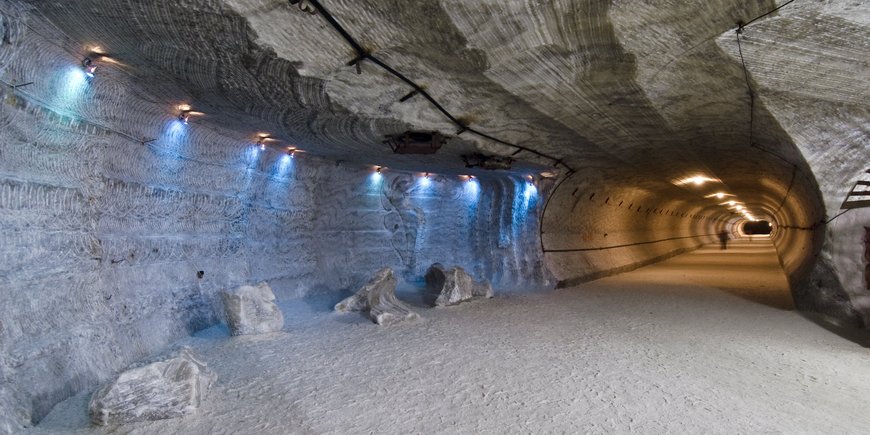by Oliver Heidbach, Michael Kühn, Leni Scheck-Wenderoth, and Josef Zens
Nuclear waste is uncanny for us. Nuclear waste scares us. Moreover, enraged demonstrations against reprocessing plants, against CASTOR transports and against final underground storage are part of Germany's cultural heritage. But, as a young researcher from the GFZ casually put it: "The stuff is there - and now it has to be got rid of."
The question is — where to put it? Where to put radiating toxic waste that will remain life-threatening for hundreds of thousands of years? Neither "politics" nor "science" can answer this question on its own. Rather, politics, science and the inhabitants of regions that come into question for a final repository site must enter into a dialogue and negotiate a solution. To this end, German policy-makers have initiated a procedure that is unique in the world, which is intended to facilitate this process — and also offers room for readjustments. One thing is clear: the underground is the best of all options. And it is also clear: as a country, we have to face up to our responsibility and cannot simply export the waste. So we have to find a site. The scientific part of the search is an enormous challenge in itself. Geosciences, with their related disciplines of geology, geophysics and geochemistry, have to face the task of identifying a place in the subsurface that guarantees safety for one million years. In this timeframe, which is unimaginable for humans, the landscape in today's Germany will change enormously, just as it has done in the last one million years. This can be deduced from the Earth's recent history and from historical records. It was 12,000 years ago that a volcano erupted in the Eifel — about as strong as Pinatubo. It is not even 300 years ago that an earthquake with a magnitude of 6.4 shook the area around Düren in what is now North Rhine-Westphalia.
This implies that during the next thousand millennia there will be severe tremors, perhaps a volcano will erupt and almost certainly a new ice age will occur. Before that, however, the sea level will continue to rise and flood the islands in the Wadden Sea. The land will still rise where, some 20,000 years ago, a kilometre-thick shield of ice had dented the Earth's crust several hundred metres deep. And plate tectonics is deforming the Earth's crust and will change our landscape, even if slowly.
Such settings need to be combined with our current knowledge of the geological formation and nature of the subsurface. To do this, we need boreholes to directly characterise the rocks and their geochemical properties. We will evaluate geophysical signals to indirectly create a kind of "ultrasound image of the subsurface" and we will use all available data to apply, extend and improve our models. To do this we are cooperating with institutions all over the world in order to research, as precisely as possible, the three host rocks that come into question for Germany: In Germany we already know a lot about rock salt, from Switzerland we have results on mudstone and from Scandinavia we have information on crystalline rock.
It is less than ten years until the planned final decision on a site. Until then, it is the task of the BGE, the Federal Company for Radioactive Waste Disposal, to use the existing data from the State Geological Surveys, the Federal Authorities and the research institutions to narrow down the areas in Germany with a favourable overall geological situation for the construction of a repository and to examine their suitability ever more precisely. At the moment, it is clear that about ,half of our country is not suitable to host a repository site.
During the course of the site selection process, stakeholders need to talk to the regulatory bodies, the scientific community and the public about what methods are used to exclude or select sites and for what reasons. At least from our side, we will actively engage in dialogue with citizens to inform them about the research questions and our answers as well as about the limits of our knowledge. We see ourselves as part of this unique site selection process and as members of the society that generated the nuclear waste.
Published in GFZ-Journal “System Erde” (System Earth) (2021) 2: No nuclear waste repository without geoscience (systemerde.gfz-potsdam.de)
Contact: endlagerforschung@gfz-potsdam.de








![[Translate to English:] Torsten Sachs in front of a climate station on a field](/fileadmin/_processed_/3/9/csm__TorstenSachs_bearbeitet_GS_4a1365ef84.jpeg)

![[Translate to English:] left image flood at the Ahrtal: image from above, several houses are flooded; left image:: Heidi Kreibich;](/fileadmin/_processed_/4/4/csm_Bild2_9af0130e9f.png)



![[Translate to English:] Start der Vega Rakete](/fileadmin/_processed_/6/4/csm_20231201-kachel_Vega-VV23-launch_ESA-CNES-Arianespace_706716b68c.jpeg)









![[Translate to English:] Poster exhibition at the Brandenburg Hydrogen Day at the GFZ, some participants in the foreground](/fileadmin/_processed_/6/5/csm_Erster_Brandenburgischer_Wasserstofftag_GFZ_402fcec95e.jpeg)
![[Translate to English:] Group picture of the participants](/fileadmin/_processed_/9/4/csm_20231108_CAWa-Workshop-Tashkent_Gruppenbild_99ea779d8a.jpeg)

![[Translate to English:] [Translate to English:] Hörsaal](/fileadmin/_processed_/e/6/csm_H%C3%B6rsal_e21ac645fb.jpeg)


![[Translate to English:] The Delegations in the Historic Library on the Telegrafenberg. In the back there are from left to right, the Dutch Ambassador for Germany, Ronald van Roeden, the Dutch Minister for Education, Culture and Science, Robbert Dijkgraaf and the scientific director of the GFZ, Susanne Buiter.](/fileadmin/_processed_/d/b/csm_Kachel-2_9eba4b4212.jpeg)

